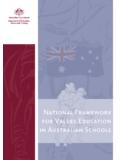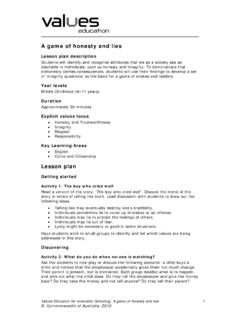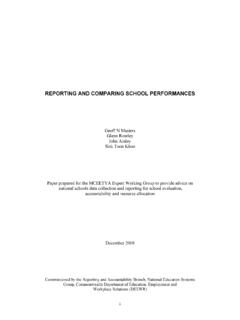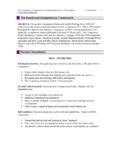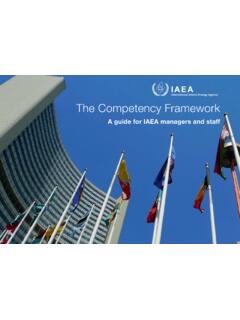Transcription of A NATIONAL FRAMEWORK FOR PROFESSIONAL …
1 A NATIONAL FRAMEWORK FORPROFESSIONAL standards FOR TEACHINGTEACHER QUALITY AND EDUCATIONAL LEADERSHIPTASKFORCEMINISTERIAL COUNCIL ON EDUCATION,EMPLOYMENT TRAINING AND YOUTH AFFAIRSNOVEMBER 2003 2003 Curriculum Corporation (as the legal entity for the Ministerial Council on Education, Employment, Trainingand Youth Affairs (MCEETYA)).Curriculum Corporation (as the legal entity for the Ministerial Council on Education, Employment, Training and YouthAffairs (MCEETYA) owns the copyright in this publication. This publication or any part of it may:(a) only be used for non-profit, educational purposes provided the source is clearly acknowledged; and(b) may not be sold or used for any other commercial than as permitted above or by the Copyright Act 1968 (Cth), no part of this publication may be reproduced,stored, published, performed, communicated or adapted, regardless of the form or means (electronic, photocopyingor otherwise), without the prior written permission of the copyright inquiries regarding copyright to: MCEETYA Secretariat, PO Box 202, Carlton South, VIC 3053, OF 3 Quality 3 Career aspirations and 4 The importance of a NATIONAL 4A NATIONAL FRAMEWORK : The development 5 The relationship of a NATIONAL FRAMEWORK to State and Territory and 6 The benefits of a NATIONAL 6 THE NATIONAL FRAMEWORK FOR PROFESSIONAL standards FOR 8 Principles underpinning the development of PROFESSIONAL standards for teaching consistentwith the 8 The 9 Career 12 APPENDIX 1.)
2 THE DEVELOPMENT PROCESS AND CONSULTATIVE 15 APPENDIX 2: CURRENT STATE AND NATIONAL 171 PREAMBLEThe NATIONAL Goals for Schooling in the 21st Century (The Adelaide Declaration) adopted by theMinisterial Council on Education, Employment Training and Youth Affairs (MCEETYA) in 1999, wasan historic commitment to improving Australian schooling within a FRAMEWORK of NATIONAL Declaration acknowledges that achievement of the agreed NATIONAL goals entails a commitment tocollaboration for the purposes of: Further strengthening schools as learning communities where teachers, students and theirfamilies work in partnership with business, industry and the wider community; Enhancing the status and quality of the teaching profession; Continuing to develop curriculum and related systems of assessment, accreditation andcredentialing that promote quality and are nationally recognised and valued; and, Increasing public confidence in school education through explicit and defensible standardsthat guide improvement in students' levels of educational achievement and through which theeffectiveness, efficiency and equity of schooling can be measured and a critical step towards the achievement of the NATIONAL goals, MCEETYA established the TeacherQuality and Educational Leadership Taskforce (TQELT) in July 2001, to provide advice, among otherthings, on: Teacher preparation and ongoing development aimed at improving the quality and standardof teaching and learning.
3 And, PROFESSIONAL standards for teachers and principals, both for entry to the profession and tomeet the ongoing needs of students over the MCEETYA meeting in July 2002, Ministers considered a report from TQELT outlining thebenefits of the development of a NATIONAL FRAMEWORK for PROFESSIONAL teaching standards . MCEETYA endorsed a recommendation that a developmental approach be adopted in relation to a nationalframework and TQELT was asked to provide advice regarding the structural components of qualityteaching across a teacher s career. As a result of a lengthy consultation process, the NationalFramework for PROFESSIONAL standards for teaching was formulated and then considered at the July2003 MCEETYA meeting. It received State, Territory & Federal Education Ministers endorsement andMinisters agreed that the next step in implementing this decision was to use the NATIONAL Frameworkto nationally align entry or graduate level standards .
4 The significance of this endorsement by Ministerscannot be overstated and other groups such as employers and PROFESSIONAL associations who areundertaking or will undertake work on standards for teaching need to recognise the imprimatur thatthe NATIONAL FRAMEWORK has and refer to it as a guide and key point of NATIONAL FRAMEWORK for PROFESSIONAL standards for teaching is the current response incontinuing efforts to define and promote quality teaching . During the 1980s and into the 1990s,teachers and teacher educators in Australia were encouraged to understand and articulate whateffective teachers do, influenced by a competency-based agenda (Louden, 2000). As part ofresponding to these challenges, the NATIONAL Competency FRAMEWORK for Beginning Teachers wasdeveloped by the NATIONAL Project on the Quality of teaching and Learning and published by theAustralian teaching Council in 1996 ( NATIONAL Project on the Quality of teaching and Learning,1996).
5 Across the country, PROFESSIONAL bodies, registration authorities, employing authorities andacademics entered discussions about developing competences for teachers work. However, criticsargued that defining teachers' work through competencies not only deskilled teachers but alsoreinforced teachers' practices as reproductive of schooling rather than being transformative ( , Rizvi, Knight, & Lingard, 1992). The potential of competencies to fragment, technicise, anddecontextualise teachers' work was highlighted ( Hattam & Smyth, 1995; Louden & Wallace,1993), as was their potential to restrict teachers' PROFESSIONAL growth rather than transform and extendit ( Whitty, 1994). Many critics were particularly concerned with a perceived emphasis on doingteaching rather than knowing about teaching . By the end of the 1990s in Australia, the UK and theUSA, there was a shift from the discourses of competencies to standards .
6 As explained by Reynolds(1999), the concept of standards still aims to make the basis for accreditation of practice transparentbut it is a broader concept than competencies as it includes a range of factors such as values andattitudes. Further, standards refocus issues of teachers processes, purposes and efforts rather thanoutcomes current NATIONAL FRAMEWORK for PROFESSIONAL standards for teaching provides an architecturewithin which generic , specialist and subject-area specific PROFESSIONAL standards can be developed atNational, and State and Territory levels. It provides an organising structure which establishes, at anational level, the agreed foundational elements and dimensions of effective teaching . TheFramework complements the NATIONAL Goals for Schooling, providing an agenda for strategic actionon teaching and learning policy at the NATIONAL level.
7 It provides an agreed language, utilisingcommonly understood terms and definitions, with which to discuss PROFESSIONAL teaching practice atthe NATIONAL level. It will therefore facilitate more effective information sharing about professionalteaching practice across jurisdictions and provide a source document for Commonwealth, State andTerritory governments to draw upon for their own strategic purposes. The FRAMEWORK also aims toenhance the effectiveness of PROFESSIONAL discourse between teachers and schools communities bothwithin and across their respective jurisdictions, as well as providing a common FRAMEWORK forprofessional dialogue between teachers, teacher educators, teacher organisations and associationsand the public. The NATIONAL FRAMEWORK will provide guidance, support and recognition for ongoingprofessional development of teachers.
8 It aims to improve alignment of standards for pre-serviceteacher education graduates across Australia and thus portability of teacher standards for teaching describe the skills, knowledge and values for effective capture key elements of teachers work, reflecting their growing expertise and professionalaspirations and achievements. standards make explicit the intuitive understandings and knowledgethat characterise good teaching practice and enable this to be widely shared within the NATIONAL FRAMEWORK for PROFESSIONAL standards for teaching provides the basis for agreement onand consistency around what constitutes quality teaching and facilitates the articulation of theknowledge, understandings, skills and values for effective teaching through development of standardsat the local level. The nature and content of standards developed and implemented at the local levelwill vary according to the purpose for which they are being developed, and the context in which theywill be achieving all these intentions, the NATIONAL FRAMEWORK provides a powerful mechanism for raisingthe status and standing of teachers, and a common reference point for engagement within theprofession and the teachingA strong and effective school education system is integral to individual success, social cohesion,progress, and NATIONAL prosperity.
9 It is clear that teachers have to be more and more successful with awide range of learners in order to prepare future citizens with the sophisticated skills needed toparticipate in a knowledge-based society. The sort of pedagogy needed to help students develop theability to think critically, create, solve complex problems and master complex subject matter, is muchmore demanding than that needed to impart and develop routine skills. Thus teachers have to be bothknowledgeable in their content areas and extremely skilful in a wide range of teaching approaches tocater for the diverse learning needs of every , a growing body of research confirms teacher quality as one of the most importantschool factors influencing student achievement ( Darling-Hammond, 2000, 2003; Santiago, 2002).Based on reviews of studies of student achievement in the United States, Darling-Hammond, LaFors,& Snyder (2001) concluded that teachers qualifications based on measures of knowledge andexpertise, education, and experience account for a larger share of the variance in students achievement than any other single factor, including poverty, race, and parent education ( ).
10 InAustralia, a number of studies have similarly concluded that the quality of teaching and learning is animportant factor accounting for variations in school students achievements ( Cuttance, 2001;QSRLS, 2001; Rowe, 2003; Rowe, Turner, & Lane, 2002).Thus, quality teaching is at the centre of schooling systems and school effectiveness, and recognitionof the critical relationship between teachers and learners highlights the need to better define andcommunicate what constitutes good teaching ( NATIONAL Reference Group for Teacher StandardsQuality and Professionalism, 2003). Likewise, specific understanding of what constitutes qualityteaching is a necessary aspect of any strategic and long-term approach to ensuring the provision ofquality teachers, and necessary also in ensuring a shared commitment across teacher employers, thecommunity and all levels of government on how best to develop and support teacher , it is increasingly agreed that identifying and publicly recognising what it is that effectiveteachers know, do and value is an important step in enhancing the public profile and standing of theprofession.
